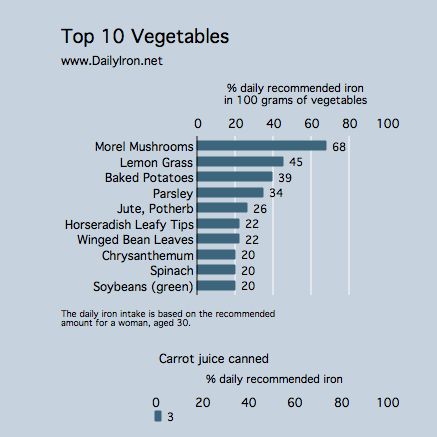Carrot juice contains .46 milligrams of iron per 100 grams. Grams is a measure of weight. To put 100 grams in perspective, consider alternative measures for this food:
- 1 cup equals 236 grams.
- 1 fl oz equals 29 grams.
In the category of vegetables, we included whole vegetable products in the Top 10 list. We excluded dried/dehydrated products from the Top 10. You will find some dehydrated vegetables high in iron per 100 grbut they tend to be far more volume than anyone would consume. Furthermore, foods may be fortified with iron but are not included in this Top 10 list. The food tested for the particular graph below can be described more specifically as:
Carrot juice, canned
Read more about iron in vegetables or visit our iron-rich foods list.

Vegetables for the most part are not an exceptional iron source. Those vegetables that do have a lot of iron also have the tendency to be loaded with iron inhibitors, making it difficult to absorb a large amount of iron from the vegetables.
Yet, even a vegetable with very little iron may play a major part in iron metabolism. Vegetables can be high in vitamin C, a vitamin that can assist you in metabolizing the iron more completely in vegetarian foods; carrot juice is a meager source of vitamin C.
Still, as an example you can include peppers and tomatoes with a grain-based entree or with a bean-based dish to improve your absorption of the iron in your entire meal. A fresh cantaloupe treat along with your meal would also raise your iron metabolism because of the fruit’s vitamin content. A glass of fruit juice is one more a great approach.